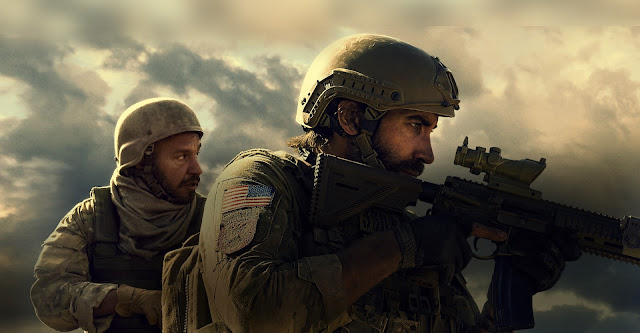OVERALL GRADE: A-
Perhaps it doesn’t surprise you, since you are a smarter viewer than I, given the title, that this war film is about obligations. I can hear you sarcastically say, “A war movie about the bond that develops between fellow soldiers? How original!” However, that’s not this film – there’s something altogether different being said about the topic here. For my money, this is one of the best films produced about the war in Afghanistan and more broadly, about the deeply spiritual obligation that arise when a deed done for us is so profoundly loving.
The story takes place in 2018 during the War in Afghanistan and follows Sergeant John Kinley, played by Jake Gyllenhaal, who heads up a unit searching for Taliban bomb materials. Their unit requires a skilled interpreter and since the last one died on duty, we are introduced to their new one named Ahmed and played by Dar Salim. The U.S. military partnered with thousands of Afghan interpreters with promises that they would eventually be given visas and allowed into America. Ahmed accompanies the unit on a couple of missions and begins to earn the trust of the men. However, after a search mission over 120 clicks from their main base goes horribly wrong, the unit is essentially dead with Sergeant Kinley hanging on for dear life and Ahmed the only one alive. In an incredible feat of guts and grace, Ahmed braves Taliban patrols and essentially carries, drags, and drives Kinley back through 120 clicks of the Afghan mountains to safety. Kinley gets medical treatment and is taken back to the states, while the stories of Ahmed’s deed spreads and forces his family underground as the Taliban search for him.
In a powerful moment when he’s explaining to his military superiors why he has to help Ahmed no matter what he says, “You think if I could be shot of this debt, I wouldn’t be? You think if I could just go through the usual channels, I wouldn’t? That is not how this debt works. It demands a result, not an appeasement. There is a hook in me. One that you cannot see. But it is there. And you think I have a choice?...I am going to get that man and his family out of the position we put him in. And of that, I have no doubt.” On a very specific and detailed level, the story is simply about the covenant or commitment/obligation that the United States has to help all those Afghan interpreters (and all those others) who put their lives and the lives of their families on the line to help us. This movie makes that clear. However, in taking time to depict the heavy existential/spiritual weight Kinley goes through as he contemplates Ahmed’s deed makes the more general case that there’s something deeply human about the need to reciprocate a deep, genuine, and graciously loving act.
For me personally, it made me think of my Christian faith and more specifically the man at the center of that faith, Jesus Christ. When I ponder the deep, genuine, and gracious love my God demonstrated for me in Christ on the cross of Calvary, I also feel like Kinley, someone completely hooked. When I first really understood the suffering of Christ, the taking on and forgiving of my sins, I realized I had no choice, there was a hook in me that knew I could do no other than to give my life back to Him and follow his loving way. It's not that much of a stretch to imagine Jesus telling a parable along the lines of the story of this film and then looking at his audience and asking, "What should the man whose life was saved do in response?" I think you know the answer.
This isn't a perfect film, but I found its examination of this idea to be really quite moving. On a production level, Guy Ritchie really knocked this one out of the park and he and his writing team prove a great match for this content. The decisions he makes here for the stylized cinematography and editing are dialed in just right to convey the sudden dangers and risk of the battlefields in Afghanistan. The accompanying score is a bit intrusive but always feels like a powerful and welcome choice. This film got overlooked as an early year release and you might have passed it by because you're not a war or Guy Ritchie fan. I recommend you give it a viewing for the powerful parable like story or at least for the two great male lead performances that anchor it.
OVERALL GRADE: A-


Comments
Post a Comment